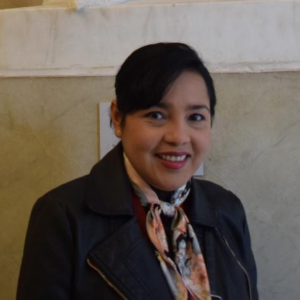Rodrigo Salas Fuentes received the B.S. and MSc. degrees in Informatics Engineering and the Dr. Eng. degree in informatics from the Federico Santa María Technical University (UTFSM) in Chile, in 2001, 2002 and 2010, respectively. From 2002 to 2004, he was a research assistant with the Informatics Department, UTFSM. Since 2004, has been with the Universidad de Valparaíso, where he is currently a Full Professor of the Biomedical Engineering School and teaches in Data Mining, Probability and Statistics, and Machine Learning. Dr. Salas is a main researcher of the Center of Research and Development in Health Engineering (CINGS-UV). His research interests include Artificial Intelligence, Machine Learning, Data Science, Decision Support Systems, Intelligent Systems and their applications to finance, air pollution, healthcare and medicine.
Title: HidroCL: Machine learning for short-term prediction of streamflow across Chile
Abstract: Geomorphology and Climate show a large variability across Chile, shaping a variety of hydrological regimes. Furthermore, the country is highly dependent on its limited water resources, which are expected to get scarcer in vast areas due to consumption increases and the impacts of climate change. However, events of high precipitation still pose a high risk for society, as they can lead to streamflow increases, water turbidity, and even floods. Hence, models able to forecast streamflow in the short-term (5-days) are valuable tools for stakeholders. This work shows the first results of a model for the prediction of daily mean and maximum streamflow up-to 5 days in advance for hundreds of catchments across Continental Chile. This model is based on Long Short-Term Memory (LSTM) jointly trained over about 300 catchments with a varying time period of at least 12 years and validated for those catchments over independent time periods and a number of catchments not used for training. For this, a large dataset was compiled with more than 150 variables spatially aggregated over about 400 catchments, including forecasted meteorological forcings, observed ecological and hydrometeorological parameters, and static attributes. Results are discussed globally and locally compared to other forecasting models.

Rodrigo Salas, Universidad de Valparaíso, Chile
Orietta Nicolis is a professor of the University Andres Bello (Chile). She obtained the PhS degree in Statistics in 1999 at the University of Padua (Italy) and a postdoctoral fellowship in statistics at the University of Brescia (Italy) in the following two years. From 2002 to 2012, she worked as Researcher and Aggregate Professor of Statistics at the University of Bergamo (Italy), in the Department of Information Technology and Mathematical Methods. At the same University she taught statistical courses for undergraduate and graduate students, supervised postgraduate thesis and was responsible for scientific research projects. From 2012 to 2018 she worked at University of Valparaiso as Associate and successively Full Professor where she was Director of the PhD Program in Statistics. Since August 2018, she is Full Professor at the Engineering Faculty of the University Andres Bello in Viña del Mar (Chile) where she is now the director of the PhD program in Engineering of Advanced Systems. In the year 2019, she obtained the Italian ASN (Abilitazione Scientifica Nazionale) for Full Professor by the Italian Ministry of Education, University and Research (according to the article 16, law 240, 2010). She has been responsible of different national ANID (National Research and Development Agency) projects on statistics, data science and artificial intelligence with applications to different fields. She is author/co-author of more than 70 scientific publications and reviewer of several international scientific journals, besides to be part of the ANID evaluation commission and co-editor of a scientific book and journals. Also, she participated to several national and international conferences as invited speaker. She is Elected member of the International Statistical Institute (ISI) and a member of several other statistical societies. In the period 2017-2018, she was a member of the executive Commission of the National Statistical Chilean Society (SOCHE). From May 2023, she is the Director of PhD program in Engineering of Advanced Systems at the University Andres Bello, Chile. Dr. Nicolis’ research interests include the study of time series models, spatial and spatial-temporal models, point processes, machine learning methods, big data, computer science, artificial intelligence, wavelet-transforms, fractional, and multifractal processes, with applications in different fields such as medicine, health, seismic events, air pollution, and geology.
Title: Predicting the label of seismic events using clustering methods and deep learning neural networks
Abstract: Earthquakes represent one of the most destructive natural phenomena worldwide, with a massive effect on the economy and human lives. Recently, the prediction of seismic events using machine learning models has gained relevance due to the availability of large amount of data as well as the improvement of computational methods, especially throughout deep learning neural network models. However, the success of these computational models strongly depends on the variables that are chosen as input. In this work we combine a clustering method for labelling earthquake events with a deep neural network approach. In particular, first, a new class of ST-BSCAN density clustering algorithm is introduced for grouping seismic events with similar features and classifying them into categories labelled foreshock, mainshock and aftershock. Then, a LSTM and a transformer neural networks are used for predicting the label of the last event. The above methods are tested on the Chilean seismic catalogue. The results show that the neural network models can predict the label of the seismic event with an accuracy greater than 0.90.

Orietta Nicolis, Universidad Andrés Bello, Chile
Daira Velandia is graduated in Mathematics and Physics. Mathematics Specialist. Master in applied statistics and Doctor in Statistics. She focuses her research on theory, methodology, and applications in spatial statistics, machine learning, and high-dimensional data, specifically in atmospheric, epidemiological, and environmental data applications. His research has developed in estimation methods and asymptotic theory in the fixed-domain asymptotic approach.
Title: Spatio-temporal analysis of drought variability in Chile
Abstract: Due to climate change, a megadrought has affected Chile since 2010, leading to a significant decrease in precipitation. In the V Region of Chile, Lake Peñuelas, a water resource for the city of Valparaíso, has experienced a substantial reduction in its capacity, forcing its use as a supply source to be suspended since January 2021. This study employs the Principal Component method, the Normalized Difference Water Index (NDWI), and the Mann Kendall test to perform a multitemporal analysis of the lake’s surface between the years 2010 and 2022, using images obtained from Landsat-8 and Landsat-9 satellites. The obtained results indicate an accelerated decrease in the surface of Lake Peñuelas beginning in 2019, with an estimated loss of 94.8% of its surface by 2022. Moreover, a Convolutional Neural Network (CNN) model was implemented to predict NDWI images and quantify changes in water bodies according to the seasons of the year. These analyses and models can provide valuable information for implementing effective control measures and protecting the country’s water resources.

Daira Velandia, Universidad de Valparaíso, Chile
Martha Bohorquez Castañeda holds a Bachelor degree in Mathematics, and a Postgraduate, M.Sc. and PhD in Statistics. Her research involves designs of sampling, analysis and modeling spatio-temporal data and functional data and their applications in various areas such as agriculture, environment, weather patterns, meteorology, epidemiology, among others. I have developed works on spatio-temporal covariance models, dynamic spatial sampling designs, complex networks, univariate and multivariate prediction and optimal sampling for spatial functional data.
Title: Modelling climate variability and change using spatio-temporal functional data
Abstract: Human beings and their activities completely depend on the climate. To improve the understanding of the characteristics and evolution of climate, it is necessary to analyze the history of the climate variability and forecast their behavior. Thus, it is necessary to have methods that allow to manage efficiently long and dense series of correlated data. The spatio-temporal functional data framework provides several powerful methods to describe, model, predict and forecast efficiently data occurred in continuous space and time.

Martha Bohorquez Castañeda, Universidad Nacional de Colombia, Colombia
Paulo Canas Rodrigues is a Professor of Statistics at the Federal University of Bahia and the Head & Principal Investigator of the Statistical Learning Laboratory (SaLLy). He completed his Ph.D. in Statistics at the Nova University of Lisbon, Portugal (2012), and his Aggregation (Habilitation) in Mathematics, specialization in Statistics and Stochastic Processes, at the Lisbon University, Portugal (2019). His research in statistical learning, statistics, and data science resulted in more than 80 scientific papers in collaboration with 126 co-authors from 61 universities in 24 countries and delivered more than 130 invited talks and seminars. He was Vice-President of the International Association for Business and Industrial Statistics (ISBIS) between 2009 and 2013, President of the Brazilian Region of the International Biometric Society (2018-2020; 2020-2022), founder and Chairman of the Latin American Regional Section of the International Association for Statistical Computing between 2017 and 2019, and the Chair of the Special Interest Group on Data Science of the International Statistical Institute between 2021 and 2023. He co-founded the Latin American Conference on Statistical Computing (LACSC) and the Conference on Statistics and Data Science (CSDS). Among other activities, he is currently the President of the International Association for Business and Industrial Statistics (ISBIS), President-Elect of the International Association for Statistical Computing, Member of the Representative Council of the International Biometric Society, and a member of the Board of Directors of the Brazilian Statistical Association. Website: www.paulocanas.org; www.SaLLy.ufba.br.
Title: Spatio-temporal modelling of the Brazilian wildfires: The influence of human and meteorological variables
Abstract: Wildfires are one of the most common natural disasters in many world regions and actively impact life quality. These events have become frequent with the increasing effect of climate change and other local policies and human behaviour. This study considers the historical data with the geographical locations of all the “fire spots” detected by the reference satellites that cover the whole Brazilian territory between January 2011 and December 2020, comprising more than 1.8 million fire spots. This data was modelled with a spatial econometric model using meteorological variables (precipitation, air temperature, humidity, and wind speed) and a human variable (land-use transition and occupation) as covariates. We find that the change in land use from forest and green areas to farming has a significant positive impact on the number of fire spots for all six Brazilian biomes. (Joint work with Jonatha Pimentel and Rodrigo Bulhões)

